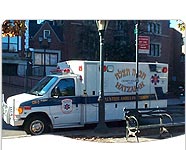 
WHO Issues Guidelines for Herbal Medicines
(Reuters) February 18, 2004 - The World Health Organisation on Tuesday
issued guidelines for ensuring the safety and efficacy of the multi-billion
dollar herbal medicines market amid reports that some products are tainted
with toxic substances.
The guidelines, intended for national regulatory bodies, lay out the best
techniques for growing and harvesting medicinal plants used for various
ailments or weight loss, as well as the clear labelling of the contents of
any product.
Herbal medicines represent an estimated $60 billion a year global market,
some 20 percent of the overall drug market, according to the U.N. agency.
Yet only China, Japan and the European Union have regulations for medicinal
plants.
"It is not a binding guideline for any country, but it is a model or sort of
checklist which they can use to make their own national regulations," Hans
Hogerzeil, acting director of WHO's essential drugs and medicines
department, told a news briefing.
The U.S. Food and Drug Administration last December issued a consumer alert
on the safety of dietary supplements containing ephedra, also called Ma
huang, a natural substance. The adrenaline-like stimulant, used for weight
loss or to boost sports performance, can have dangerous cardiac effects.
In Africa, up to 80 percent of the population depends on traditional
medicine for primary health care. In China, herbal preparations account for
up to 50 percent of total consumption.
In Europe, North America and other industrialised areas, more than 50
percent report using complementary or alternative medicine at least once,
according to WHO.
"There is also an enormous industry now where huge amounts of leaves and
traditional medicines are being shipped from various exporting countries -
China, India, Pakistan - to many other countries. Somebody has to regulate
that, at least their safety," Hogerzeil said.
Copyright 2003 Reuters Limited. All rights reserved. Republication or
redistribution of Reuters content, including by framing or similar means, is
expressly prohibited without the prior written consent of Reuters. Reuters
shall not be liable for any errors or delays in the content, or for any
actions taken in reliance thereon. Reuters and the Reuters sphere logo are
registered trademarks and trademarks of the Reuters group of companies
around the world.
The above is for general informational purposes only. Always consult your
physician regarding specific medical issues and call Hatzalah or your local
ambulance service in the event of an emergency.
Back to Digest Index
|









